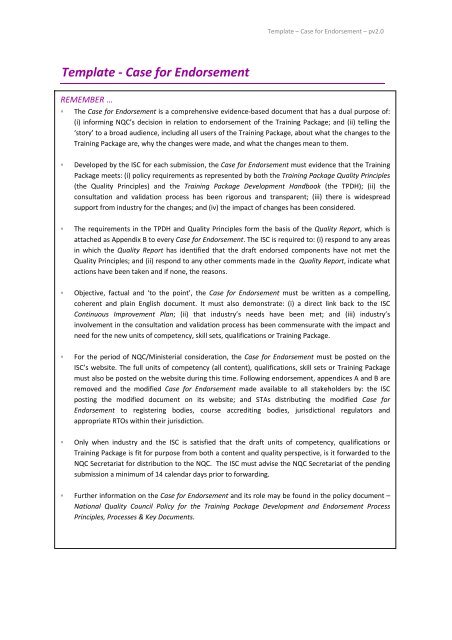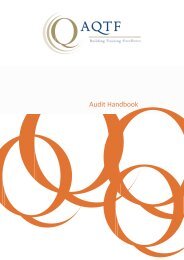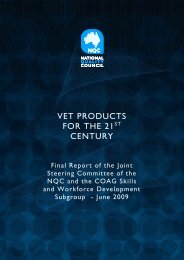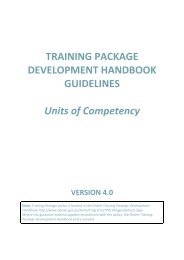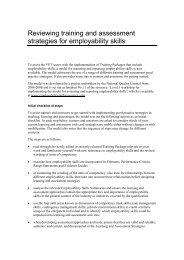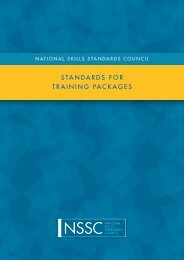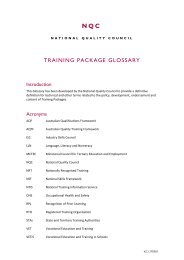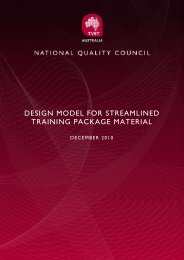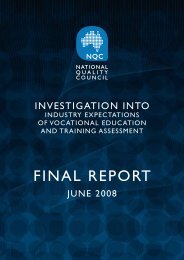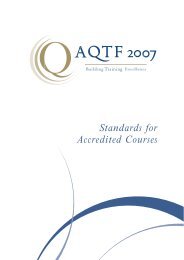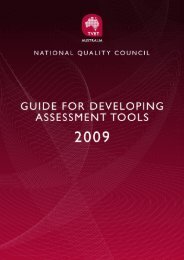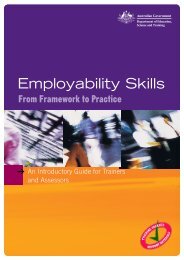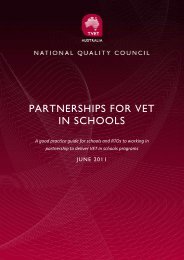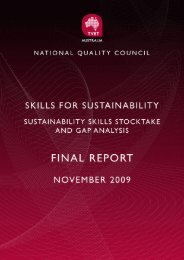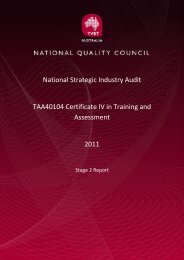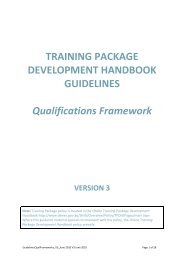Template - Case for Endorsement - National Skills Standards Council
Template - Case for Endorsement - National Skills Standards Council
Template - Case for Endorsement - National Skills Standards Council
You also want an ePaper? Increase the reach of your titles
YUMPU automatically turns print PDFs into web optimized ePapers that Google loves.
<strong>Template</strong> – <strong>Case</strong> <strong>for</strong> <strong>Endorsement</strong> – pv2.0<br />
<strong>Template</strong> ‐ <strong>Case</strong> <strong>for</strong> <strong>Endorsement</strong><br />
REMEMBER …<br />
• The <strong>Case</strong> <strong>for</strong> <strong>Endorsement</strong> is a comprehensive evidence‐based document that has a dual purpose of:<br />
(i) in<strong>for</strong>ming NQC’s decision in relation to endorsement of the Training Package; and (ii) telling the<br />
‘story’ to a broad audience, including all users of the Training Package, about what the changes to the<br />
Training Package are, why the changes were made, and what the changes mean to them.<br />
• Developed by the ISC <strong>for</strong> each submission, the <strong>Case</strong> <strong>for</strong> <strong>Endorsement</strong> must evidence that the Training<br />
Package meets: (i) policy requirements as represented by both the Training Package Quality Principles<br />
(the Quality Principles) and the Training Package Development Handbook (the TPDH); (ii) the<br />
consultation and validation process has been rigorous and transparent; (iii) there is widespread<br />
support from industry <strong>for</strong> the changes; and (iv) the impact of changes has been considered.<br />
• The requirements in the TPDH and Quality Principles <strong>for</strong>m the basis of the Quality Report, which is<br />
attached as Appendix B to every <strong>Case</strong> <strong>for</strong> <strong>Endorsement</strong>. The ISC is required to: (i) respond to any areas<br />
in which the Quality Report has identified that the draft endorsed components have not met the<br />
Quality Principles; and (ii) respond to any other comments made in the Quality Report, indicate what<br />
actions have been taken and if none, the reasons.<br />
• Objective, factual and ‘to the point’, the <strong>Case</strong> <strong>for</strong> <strong>Endorsement</strong> must be written as a compelling,<br />
coherent and plain English document. It must also demonstrate: (i) a direct link back to the ISC<br />
Continuous Improvement Plan; (ii) that industry’s needs have been met; and (iii) industry’s<br />
involvement in the consultation and validation process has been commensurate with the impact and<br />
need <strong>for</strong> the new units of competency, skill sets, qualifications or Training Package.<br />
• For the period of NQC/Ministerial consideration, the <strong>Case</strong> <strong>for</strong> <strong>Endorsement</strong> must be posted on the<br />
ISC’s website. The full units of competency (all content), qualifications, skill sets or Training Package<br />
must also be posted on the website during this time. Following endorsement, appendices A and B are<br />
removed and the modified <strong>Case</strong> <strong>for</strong> <strong>Endorsement</strong> made available to all stakeholders by: the ISC<br />
posting the modified document on its website; and STAs distributing the modified <strong>Case</strong> <strong>for</strong><br />
<strong>Endorsement</strong> to registering bodies, course accrediting bodies, jurisdictional regulators and<br />
appropriate RTOs within their jurisdiction.<br />
• Only when industry and the ISC is satisfied that the draft units of competency, qualifications or<br />
Training Package is fit <strong>for</strong> purpose from both a content and quality perspective, is it <strong>for</strong>warded to the<br />
NQC Secretariat <strong>for</strong> distribution to the NQC. The ISC must advise the NQC Secretariat of the pending<br />
submission a minimum of 14 calendar days prior to <strong>for</strong>warding.<br />
• Further in<strong>for</strong>mation on the <strong>Case</strong> <strong>for</strong> <strong>Endorsement</strong> and its role may be found in the policy document –<br />
<strong>National</strong> Quality <strong>Council</strong> Policy <strong>for</strong> the Training Package Development and <strong>Endorsement</strong> Process<br />
Principles, Processes & Key Documents.
<strong>Template</strong> – <strong>Case</strong> <strong>for</strong> <strong>Endorsement</strong> – pv2.0<br />
<strong>Template</strong><br />
COVER<br />
INDEX<br />
OVERVIEW<br />
• Provide a short overview of the submission being put <strong>for</strong>ward <strong>for</strong> endorsement by the<br />
NQC. This should be no more than two pages and give NQC members and stakeholders a<br />
comprehensive picture of what is being put <strong>for</strong>ward <strong>for</strong> endorsement and its importance<br />
to industry. It should also identify any issues of importance regarding the submission.<br />
• The Overview section will <strong>for</strong>m part of the modified <strong>Case</strong> <strong>for</strong> <strong>Endorsement</strong> document to<br />
be made publicly available to all stakeholders post‐endorsement. Some issues that could<br />
be raised in this section (e.g. reference to a ‘report by exception’, issues raised in the<br />
Quality Report) will be addressed as part of the endorsement process and may not be<br />
appropriate <strong>for</strong> inclusion in the post‐endorsement public document. ISCs should be<br />
mindful of the dual purpose nature of the <strong>Case</strong> <strong>for</strong> <strong>Endorsement</strong> during drafting. In some<br />
instances, ISCs may need to revisit text in the body of the <strong>Case</strong> <strong>for</strong> <strong>Endorsement</strong> be<strong>for</strong>e<br />
finalising the post‐endorsement public version.<br />
Note on transition: The <strong>Case</strong> <strong>for</strong> <strong>Endorsement</strong> requirements in this template apply to all new Training<br />
Package development work from 1 January 2010, and development work already in train that had not<br />
reached the stakeholder agreement stage at 1 January 2010. In all other cases ISCs may lodge a <strong>Case</strong><br />
<strong>for</strong> <strong>Endorsement</strong> using the <strong>for</strong>mer template until 31 March 2010 but are strongly encouraged to<br />
comply with the new requirements earlier where possible.<br />
SECTION 1‐– RESPONSIVENESS & RECOGNITION QUALITY PRINCIPLES<br />
• Provide evidence that the units of competency, skill sets 1 , qualifications or Training Package<br />
being put <strong>for</strong>ward <strong>for</strong> endorsement:<br />
- reflect contemporary work organisation and job profiles<br />
- are driven by industry’s needs<br />
- respond to government broad policy initiatives<br />
- recognise convergence and connectivity of skills<br />
- support movement of skills within and across organisations and sectors<br />
- promote national and international portability<br />
- reflect licensing and regulatory requirements.<br />
1 Skill sets using current endorsed units of competency are an ISC Upgrade and do not require NQC endorsement.<br />
Further in<strong>for</strong>mation on Categories of Change is in the Training Package Development and <strong>Endorsement</strong> Process<br />
document.
<strong>Template</strong> – <strong>Case</strong> <strong>for</strong> <strong>Endorsement</strong> – pv2.0<br />
• Provide a ‘report by exception’ (only if required) on stakeholder consensus to flag where a<br />
stakeholder or individual holds a significantly differing viewpoint 2 from the majority. It<br />
should provide an objective view of the issue and steps taken by the ISC to resolve the<br />
matter or that reasonable measures have been taken to respond to stakeholder concerns.<br />
Note: Issues raised in a ‘report by exception’ will be addressed as part of the endorsement process. ISCs<br />
may wish to remove a ‘report by exception’ prior to finalising the post‐endorsement public version.<br />
SECTION 2 –– FLEXIBILITY & FUNCTIONALITY QUALITY PRINCIPLES<br />
• Provide evidence that the units of competency, skill sets 3 , qualifications or Training Package<br />
being put <strong>for</strong>ward <strong>for</strong> endorsement:<br />
- meet the diversity of individual and enterprise needs<br />
- support equitable access and progression of learners<br />
- support learner transition between education sectors<br />
- support implementation across a range of settings<br />
- support Sound Assessment Practice<br />
- do not impose structural barriers to implementation.<br />
• Attach a copy of the Quality Report completed by a holistic quality assurance member of<br />
the ISC Quality Assurance Panel (the Panel) at Appendix B.<br />
• If the Quality Report has identified areas where the draft endorsed components have not<br />
met the Training Package Quality Principles, the ISC must confirm that it has responded to<br />
the recommendations. Where the ISC has not adopted a recommendation, it must provide<br />
commentary and full justification, either in the body of the <strong>Case</strong> <strong>for</strong> <strong>Endorsement</strong> or in a<br />
separate attachment to Appendix B. ISCs will be guided on the seriousness of the issues<br />
raised, keeping in mind that evidence the draft endorsed components meet the Training<br />
Package Quality Principles is a key element <strong>for</strong> NQC considerations.<br />
Note: Issues raised in a Quality Report, and the ISC’s response, will be addressed as part of the<br />
endorsement process. ISCs may wish to remove text regarding a Quality Report from the body of a <strong>Case</strong><br />
<strong>for</strong> <strong>Endorsement</strong> prior to finalising the post‐endorsement public version.<br />
SECTION 3 – IMPACT OF CHANGES<br />
• Set out the implications of the new or revised units of competency, skill sets, qualifications<br />
or Training Package in various delivery environments, and the extent of change required to<br />
enable successful implementation.<br />
2 ‘Significant’ is where the issue is of such an importance that it will impact on the product’s ability to be<br />
implemented. The ‘viewpoint’ relates directly to the content and/or structure of the draft endorsed components.<br />
3 Skill sets using current endorsed units of competency are an ISC Upgrade and do not require NQC endorsement.<br />
Further in<strong>for</strong>mation on Categories of Change is in the Training Package Development and <strong>Endorsement</strong> Process<br />
2008 document.
<strong>Template</strong> – <strong>Case</strong> <strong>for</strong> <strong>Endorsement</strong> – pv2.0<br />
• Briefly state industry’s imperatives and timelines <strong>for</strong> implementation of the components.<br />
• Note any overarching expectations industry has of the delivery/assessment of the<br />
components.<br />
• Provide advice on the extent of change and key implications <strong>for</strong> the following<br />
environments/stakeholders as a result of the newly endorsed products:<br />
- Public/private training and assessment services (include delivery<br />
issues/resource implications)<br />
- Enterprises<br />
- Licensing and regulatory environments<br />
- Policy environment (this includes but is not necessarily limited to the VET<br />
environment. For example, the ISC should be aware of policy implications of<br />
broader government and industry policy).<br />
• Identify systemic issues that need to be addressed to ensure successful implementation.<br />
• While of interest to NQC members, the primary audience <strong>for</strong> Section 3 are those<br />
stakeholders critical to successful implementation, such as STAs and RTOs. ISCs will typically<br />
gather in<strong>for</strong>mation throughout the consultation and validation process including from<br />
enterprises, licensing and regulatory bodies, RTOs, employer and employee representatives,<br />
the Department and STAs.<br />
APPENDIX A: COMPONENTS FOR ENDORSEMENT<br />
Provide a copy of:<br />
• Qualification titles and packaging rules<br />
• Unit titles and codes (do not provide the content of the units of competency. This will<br />
already have been agreed by industry during the validation stage and considered by<br />
State/Territory Training Authorities (STAs).<br />
• Advice on occupational and licensing requirements or assessment specific to the units of<br />
competency and qualifications being submitted <strong>for</strong> endorsement<br />
• Mapping in<strong>for</strong>mation between old and replacement units of competency and<br />
qualifications<br />
• Training Package modification history.<br />
Note: When submitting the draft endorsed components, do not provide text which has been<br />
approved <strong>for</strong> insertion in all Training Packages, <strong>for</strong> example, Assessment Guidelines<br />
mandated text.<br />
Note: Appendix A is to be removed following NQC endorsement.<br />
APPENDIX B: QUALITY REPORT<br />
Note: Appendix B is to be removed following NQC endorsement.


